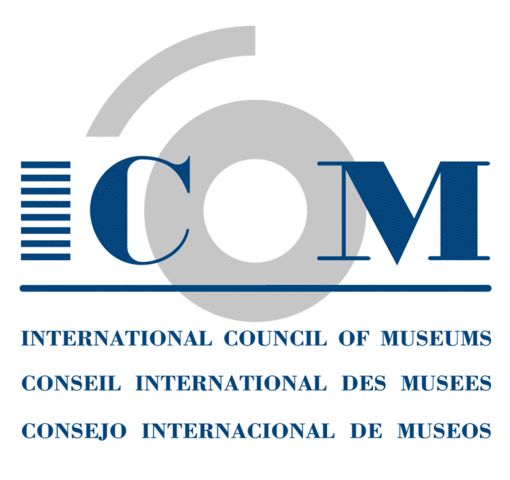
国际博物馆协会标志
博物馆的新定义即将出炉
回顾博物馆定义的历史
新美术馆学/编
2019年,国际博物馆协会发起对博物馆新定义进行提案,并将于9月7日最终投票,这一事项引起了社会的极大关注和讨论。定义是说改就改的么,博物馆的定义历史上是怎么变化的?来龙去脉如何?本期让我们了解一下博物馆定义的流变,和博物馆新定义的前前后后。
2019年,国际博物馆协会发起对博物馆新定义进行提案,并将于9月7日最终投票,这一

图画中的“亚历山大博物院”(Mouseion ofAlexandria)
博物馆定义的历史
汉语中的“博物馆”一词译自英文的“Museum”。几乎大部分西方语言,包括法语、德语、意大利语、西班牙语,甚至俄语都源于希腊语的“ Mouseion”,根据1971年版的《牛津英文大字典》解释,这一词的含义是“缪斯的所在地”,为了对缪斯(Muses)———宙斯和记忆女神的九个活泼女儿———表示敬意。法国学者G.比代在《希腊语-拉丁语词典》中将博物馆一词解释为“供奉缪斯、从事研究之处所”。
博物馆在古典文化中意味着热爱知识而冥思苦想,因而也成为丰富知识的象征。正因为如此,它在当时有着比今天远为广泛的内涵,这在被称为世界第一所博物馆的“亚历山大博物院”(Mouseion ofAlexandria)的建制及其所从事的活动中便可看出。亚历山大博物院在“Mouseion”这一概念下所从事的几乎囊括了现代社会主要文化教育机构的全部活动,包括大学、研究院、图书馆、档案馆和收藏室。就其本意来说,这个词指的是“大学建筑物”,是“用于追求治学和学艺的大楼或房舍”,即由教授们用于研究、写作和讲课的场所。在这座大学里,设有为教学和科研服务的实验室、图书馆、档案室和收藏室,收藏的物品包括动植物标本、美术品和国内外的珍贵物品,此外还有动物园和植物园等。可见,古典的博物馆(Mouseion)概念所指的是广泛而集中地进行科学研究和知识传播、具有高度综合性的文化殿堂。
在经历了基督教欧洲长达近十个世纪的禁用后,到文艺复兴时代,“Mouseion”这一概念又重新回到人们的生活中:首先出现在佛罗伦萨梅蒂奇家族的收藏中,继而又被用来称呼第一座近代意义博物馆———牛津大学阿什米尔博物馆。在此之后,它成为一个固定的、具有独特内涵的名称。然而这一次“Museum”重新出现,已经不再具有古典社会那种极度丰富、广泛的内涵和高度综合性的特征。随着近代社会文化和学术活动的发展与分化,原来博物馆中的各种机构纷纷从母体中分离,成为专门的独立建制。
从事学术研究和讲课的场所由源于拉丁文的“ Univer-sity”(大学)取代,贮藏图书资料的场所专门称为“Library”(图书馆),从事测试和分析的地方称为“ Laboratory”(实验室),而“Archives”则专指档案的收藏。这样一来,“Museum”的内涵大大地缩小了,成了专指用于收藏、研究和展出对人类智慧发展具有价值的物品的场所。
在阿什莫尔与赫斯特关于特拉德斯干收藏归属的诉讼中,我们看到了对近代博物馆概念的最初解释,这是17世纪后半叶的事。对这一概念作出解释的,不是博物馆学家,甚至不是博物馆中人,而是当时处理这一诉讼案的法院。当时的法律文件对“博物馆”一词的解释是:一个“贮存和收藏各种自然、科学与文学珍品或趣物或艺术品的场所。”由此可见,博物馆已经专门被看作是为了收藏品的安全和保护的目的而营造的建筑。
为博物馆制定能够被普遍认可的定义的努力主要是博物馆国际组织产生之后的事。
——严建强,梁晓艳.博物馆(MUSEUM)的定义及其理解[J].中国博物馆,2001(01)

图片1977年5月18日至29日,国际博物馆协会第11届大会。
在不同时代,国际博物馆协会对于博物馆的定义
国际博物馆协会(ICOM)成立于1946年,是博物馆和博物馆专业人士的全球性组织,当前有来自各大洲140个国家的40,000名会员。国际博物馆协会为博物馆提供了一个共享的道德框架,一个开展专业讨论的论坛,以及一个研究和赞颂博物馆和文化机构中的遗产与收藏的平台。国际博物馆协会从成立之初以来,就在不断的根据时代变化适时地修改关于博物馆的定义。
1946年
博物馆这个词包括藏品对公众开放的所有艺术的、技术的、科学的、历史的或考古的(机构),包括动物园和植物园,但是图书馆除外,仅包括保持永久展厅的图书馆。
1956年
博物馆这个词在此是特指任何永久性(固定性)机构,普遍意义地讲,以各种形式的保存、研究、提高为目的,特别是以接待和展示向公众展出具有文化价值的艺术的、历史的、科学和技术的藏品和标本的机构、植物园、动物园和水族馆。隶属公共图书馆和公共档案馆的常设性展馆可被认为是博物馆。
1961年
国际博物馆协会将承认以研究、教育、欣赏为目的而保护和展出具有文化和科学重要性的藏品的任何永久性(固定性)机构为博物馆。定义中包括:a.公共图书馆和档案馆的常设性展出馆;b.正式向公众开放的历史古迹和部分历史古迹或它们的从属物,例如教堂珍宝、历史遗址、考古遗址和自然遗址;c.植物园、动物园、水族馆、生态园和展出动物、植物活标本的其他机构;d.自然保护区。
1974年
博物馆是一个以研究、教育、欣赏为目的而征集、保护、研究、传播和展出人及人的环境的物证的、为社会及其发展服务的、向大众开放的、非营利的永久性(固定性)机构。除被指定为“博物馆”外,国际博物馆协会承认下列符合博物馆定义机构:a.图书馆和档案中心的常设性保护研究机构和展出馆;b.从事征集、保护和传播活动的,具有博物馆性质的自然、考古及人类学的历史古迹和遗址;c.展出动物、植物活标本的机构,如植物园、动物园、水族馆和生态园等;d.自然保护区;e.科学中心及天文馆。
1989年
博物馆是一个以研究、教育、欣赏为目的而征集、保护、研究、传播和展出人类及人类环境的物证的、为社会及其发展服务的、向大众开放的、非营利的永久性(固定性)机构。
(1)博物馆上述定义不受任何政体性质、地域特征、职能机构或相关机构收藏藏品的定位等因素的限制而予以适用。(2)除被指定为“博物馆”的机构外,以下机构具有博物馆资格:i.从事征集、保护和传播人类及人类环境物证的,具有博物馆性质的自然、考古及人类学的历史古迹和遗址;ii.拥有并展出动物、植物活标本的机构,如植物园、动物园、水族馆和生态园;iii.科学中心及天文馆;iv.图书馆和档案中心的常设性保护研究机构和展出馆;v.自然保护区;vi.执行委员会经征求咨询委员会意见后认为其具有博物馆的部分或全部特征,支持博物馆及博物馆专业工作人员从事博物馆学研究、教育或培训的其他机构。
1995年
博物馆是一个以研究、教育、欣赏为目的而征集、保护、研究、传播和展出人类及人类环境的物证的、为社会及其发展服务的、向大众开放的、非营利的永久性(固定性)机构。
(1)博物馆上述定义不受任何政体性质、地域特征、职能机构或相关机构收藏藏品的定位等因素的限制而予以适用。(2)除被指定为“博物馆”的机构外,以下机构具有博物馆资格:i.从事征集、保护和传播人类及人类环境物证的,具有博物馆性质的自然、考古及人类学的历史古迹和遗址;ii.拥有并展出动物、植物活标本的机构,如植物园、动物园、水族馆和人工动植物生态园;iii.科学中心及天文馆;iv.图书馆和档案中心的常设性保护研究机构和展出馆;v.自然保护区;vi.符合前述定义的国际、国家、区域性或地方性博物馆组织、负责博物馆管理的政府部门或公共机构;vii.从事与博物馆和博物馆学相关的研究、教育、培训、记录和其他事务的非营利机构或组织;viii.执行委员会经征求咨询委员会意见后认为其具有博物馆的部分或全部特征,支持博物馆及博物馆专业工作人员从事博物馆学研究、教育或培训的其他机构。
2001年
博物馆是一个以研究、教育、欣赏为目的而征集、保护、研究、传播和展出人类及人类环境的物证的、为社会及其发展服务的、向大众开放的、非营利的永久性(固定性)机构。
(1)博物馆上述定义不受任何政体性质、地域特征、职能机构或相关机构收藏藏品的定位等因素的限制而予以适用。(2)除被指定为“博物馆”的机构外,以下机构具有博物馆资格:i.从事征集、保护和传播人类及人类环境物证的,具有博物馆性质的自然、考古及人类学的历史古迹和遗址;ii.拥有并展出动物、植物活标本的机构,如植物园、动物园、水族馆和人工生态园;iii.科学中心和天文馆;iv.非营利的艺术展出馆;v.自然保护区;vi.符合前述定义的国际、国家、区域或地方性博物馆组织、负责博物馆管理的政府部门或公共机构;vii.从事与博物馆和博物馆学相关的文物保护、研究、教育、培训、记录和其他事务的非营利机构或组织;viii.从事保护、传承和管理有形和无形遗产(活的遗产和数字创造性活动)的文化中心和其他实体;ix.执行委员会经征求咨询委员会意见后认为其具有博物馆的部分或全部特征,支持博物馆及博物馆专业职员从事博物馆学研究、教育或培训的其他机构。
2007年
博物馆是一个为社会及其发展服务的、向公众开放的非营利性常设机构,为教育、研究、欣赏的目的征集、保护、研究、传播并展出人类及人类环境的物质及非物质遗产。

1986年10月26日至11月4日,阿根廷布宜诺斯艾利斯,国际博物馆协会第14届大会。
在国际博物馆协会的定义之外,世界各国也有着自己对于博物馆的定义:
日本(1951年)
博物馆是收集、保管(培育)陈列展出有关历史、艺术、民俗、产业、自然科学等资料,从教育角度出发供一般市民公众利用,为有助于提高其文化素养,供其调查研究、休息娱乐等而举办必要的事业,并对此资料进行调查研究为目的的机构。
美国(1962年)
博物馆是非营利的永久性机构,存在根本目的不是为组织临时性展览,享受豁免联邦和州所得税,代表公众利益进行管理并向社会开放,而是为公众教育和欣赏的目的保存、保护、研究、阐释、收集和展览具有教育和文化价值的物体和标本,包括艺术的、科学的(无论有生命的或是无生命的)、历史的和技术的材料。此博物馆定义包括具备上述必要条件的植物园、动物园、水族馆、天文馆、保存历史记忆的街区、古建筑和遗址。
韩国(1991年)
博物馆是收藏、保护、陈列有关人类、历史、考古、民族习俗、艺术、动物、植物、矿物、科学、技术和工业的物品的机构,为文化、艺术和科研的发展以及为一般民众的社会教育的目的而探查和研究这些物品。
意大利(1995年)
博物馆是向公众开放的文化机构,调查、征集、研究、展出和宣扬作为文化的物证的物品,其职能是为公共利益而保存、科学研究、教育和宣扬文化财产。
英国(2002年)
博物馆能够使公众通过探究藏品获得启迪、知识和快乐。它们是承担着社会信托责任而征集、保护、展示文物和标本的机构。英国博物馆协会期望所属博物馆做到:代表社会利益保藏文物;积极服务公众;鼓励公众通过探究藏品获得启迪、知识和快乐;指导和参与社区活动;诚实地和负责任地征集文物;为长久公共利益保护好藏品;为了公众的利益,承认谁制造的、谁使用的、谁拥有的、谁收集的和谁捐赠的藏品;支持保护自然和人类环境;研究、共享和阐释相关文物藏品的信息,并反映不同观点。
法国(2002年)
博物馆是以服务公众知识、教育和欣赏为目的而组织藏品,代表公共利益保护和陈列藏品的永久性机构。法国的博物馆具有以下永久使命:a)保护、修复、研究和增加藏品;b)尽可能地将藏品向更多的观众展出;c)制定和执行教育和传播文化的计划和任务;d)为知识的进步、研究以及传播而贡献力量。
中国(2015年)
博物馆是指以教育、研究和欣赏为目的,收藏、保护并向公众展示人类活动和自然环境的见证物,经登记管理机关依法登记的非营利组织。
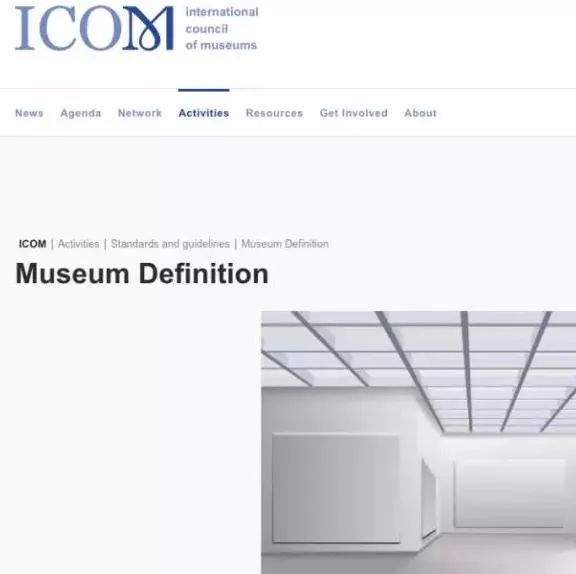
国际博物馆协会官网页面——定义博物馆
国际博物馆协会的博物馆新定义
1、为什么要新定义
近几十年来,随着博物馆发生巨大转变,其原则、政策以及实践都对应做出了调整及改变。与此同时,国际博物馆协会(ICOM)现有的博物馆定义却似乎已经不能反映目前博物馆所遇的挑战、前景和责任。对此,国际博物馆协会邀请协会成员与其他相关成员共同参与,提交新定义的提案,以制定一个全新的、更符合当下的博物馆定义。
2、国际博物馆协会为提出新定义的准备
2015至2016年,25位国际博物馆理事会成员的工作组对于博物馆定义进行预研究。
2017年,国际博物馆理事会执行委员会任命了一个新的常设委员会,即“博物馆定义、期望和提案常设委员会”(MDPP)。工作组没有就现行博物馆定义是否应保持原状、局部修改或进行实质上重新拟定达成明确共识,但最初的讨论以及逐字逐句的分析,阐明了现行博物馆定义面临的关键挑战。“博物馆定义、期望和提案常设委员会”的工作已包括了这些分析以及2003至2004年就新博物馆定义开展的广泛讨论。与以前关于国际博物馆协会博物馆定义的讨论截然不同,“博物馆定义、期望和提案常设委员会”被要求完成两项任务,其一是记录和分析流行的社会趋势,这些趋势如何影响博物馆,博物馆如何预测、抵制并适应它们;另一任务是在此背景下向国际博物馆协会执委会和咨询委员会提出关于修订现行博物馆定义的潜在需求的建议。
2018年9月9日,博物馆定义、期望和提案常设委员会(MDPP)提交国际博物馆协会执委会的关于当前使用的博物馆定义的可能的修订建议已获得同意。
2018年10月,博物馆定义、期望和提案常设委员会(MDPP)提交报告。
2018年12月,国际博物馆协会(ICOM)执行委员会批准的《博物馆定义、期望和提案常设委员会(MDPP)报告》,国际博物馆协会执委会决定制定一个新定义,新定义将更符合和适用于21世纪的博物馆及未来的博物馆行业。新定义应该承认身处不同的和快速变化社会中的博物馆的不同条件及做法,支持博物馆开发和采用新的科技方法,并更充分关注21世纪的复杂性。
2019年2月13日,国际博物馆协会官网发布公告,国际博物馆协会(ICOM)邀请协会成员与其他相关成员共同参与博物馆新定义的提案,以制定一个全新的、更符合当下的博物馆定义。参与者可以2019年5月20日之前在国际博物馆协会官网的表格上提交新定义的提案,新提案也将官网上持续发布。
2019年7月21日至22日,在巴黎举行的第139届会议上达成了以下决定:
“国际博物馆协会执委会选择以下内容作为新的博物馆定义,以便以投票方式决定是否纳入国际博物馆协会章程,以替代现有的博物馆定义。投票将在国际博物馆协会下次特别大会(EGA)上进行,该会议将于2019年9月7日9日上午9点30至10点30分,在日本京都国际会议中心(ICC Kyoto)召开。”
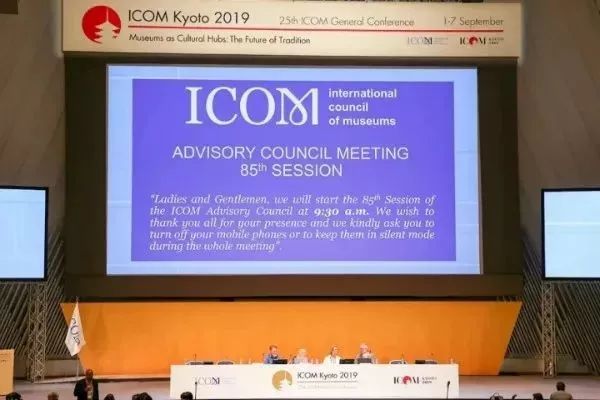
2019年9月1日,国际博物馆协会第85届咨询委员会会议在京都召开。
2019年9月7日,国际博物馆协会执委会将以投票方式决定是否纳入国际博物馆协会章程,以替代现有的博物馆定义。投票将在日本京都国际会议中心(ICC Kyoto)召开的国际博物馆协会下次特别大会(EGA)上进行。
附:中国博物馆界的行动:
2017年,北京大学考古文博学院举办“博物馆与博物馆学——新时代博物馆定义的再思考”国际研讨会
2019年3月29日,由中国博物馆协会、中国文物报社主办,常州博物馆、《中国博物馆》编辑部承办的“新时代博物馆定义研究”学术研讨会于3月29日在常州博物馆召开。来自《中国博物馆》编委会委员、国内博物馆领导专家、高校博物馆学专业教授、青年学者等30余人参加了研讨会。国际博物馆协会副主席、中国博物馆协会副理事长兼秘书长安来顺出席并主持了研讨会。

国际博物馆协会官网页面2019年2月13日截图,号召更多人参与参与博物馆新定义。
3、国际博物馆协会认为新定义的提案应具备下列因素:
·博物馆定义应明确博物馆的目的,以及博物馆在21世纪应对可持续的、道德的、政治的、社会的和文化的挑战及所承担责任的价值基础。
·博物馆定义应保留博物馆收集、保护、记录、研究、展览的功能以及传播藏品和其它文化遗产证据的多种方式的独特、明确和必要性的统一,即便当前的术语可能不尽一致。
·博物馆定义应承认自然危机的急迫性以及制定和实施可持续解决方案的紧迫性。
·博物馆定义应承认并尊重和顾及全球各地博物馆工作所依循的各种世界观、条件和传统。
·博物馆定义应承认并关切全球及国家、地区和地方的遗留的且持续存在的深刻的社会不平等及权力与财富的不平等。
·博物馆定义应表达博物馆在与其社区的协作、共同承诺、责任和权力的关系中的专家角色。
·博物馆定义应表达博物馆作为有意义的会晤场所,以及开放及多样化学习与交流平台的承诺。
·博物馆定义应表明博物馆在获得和使用其物质、财务、社会和智力资源上应是可问责的和透明的。
图片
2019年9月2日,第25届国际博物馆协会大会在日本国立京都国际会馆盛大开幕,来自全球100多个国家的数千位博物馆馆长、专家学者及相关文博人员参会。
4、博物馆新定义提案精选
2019年7月22日,国际博物馆协会官网公布的最终投票方案:
国际博物馆协会执委会选择以下内容作为新的博物馆定义,以便以投票方式决定是否纳入国际博物馆协会章程,以替代现有的博物馆定义。
即将提交投票的博物馆定义如下:
1)博物馆是用来进行关于过去和未来的思辨对话的空间,具有民主性、包容性与多元性。博物馆承认并解决当前的冲突和挑战,为社会保管艺术品和标本,为子孙后代保护多样的记忆,保障所有人享有平等的权利和平等获取遗产的权利。
2)博物馆并非为了盈利。它们具有可参与性和透明度,与各种社区展开积极合作,通过共同收藏、保管、研究、阐释和展示,增进人们对世界的理解,旨在为人类尊严和社会正义、全球平等和地球福祉做出贡献。
国际博物馆协会官网发布的即将投票的定义原文:
Museums are democratising, inclusive and polyphonic spaces for critical dialogue about the pasts and the futures. Acknowledging and addressing the conflicts and challenges of the present, they hold artefacts and specimens in trust for society, safeguard diverse memories for future generations and guarantee equal rights and equal access to heritage for all people.
Museums are not for profit. They are participatory and transparent, and work in active partnership with and for diverse communities to collect, preserve, research, interpret, exhibit, and enhance understandings of the world, aiming to contribute to human dignity and social justice, global equality and planetary wellbeing.
截至2019年7月,国际博物馆协会共收到了来自全球各地的269份(包括中国在内)新博物馆定义提案,十分丰富,可以看到世界博物馆人士对于博物馆未来的思考,精选部分提案供大家了解:
1、澳大利亚
博物馆可以是实际存在的或者概念上的,包括存在于网络上。博物馆这一独特的设施,以成百上千种方式收集、保存、记录、研究、传递着物质与非物质文化遗产、历史、科学与艺术。更重要的是,博物馆是创造知识、汇集人类认同、确立文化规约之所,同时也向着更加多样性的未来发起挑战。
Museums are unique physical and conceptual sites, including online, that collect, preserve, document, research, and communicate tangible and intangible cultural heritage, history, science, and art in a myriad of ways. More than this they are important sites of knowledge production and play a role in how collectives of people identify and re/affirm cultural norms and at the same time are well placed to challenge them for a more diverse future.
2、墨西哥
博物馆是一个实际存在的或者虚拟的活跃空间,通过保护与宣传具有历史意义的物品诠释着整个社会。
The museum is an active (physical or digital) space that articulates society through the care and dissemination of objects of historical importance.
3、也门
博物馆不仅仅是保存和展示纪念物的机构,而是沟通过去与未来的链接,我们通过它鉴古知今。
Museum is no longer an institution to preserve and display monuments only but is a link between the past and the future through which we draw a picture of the past and take lessons for the present.
4、印度
博物馆提供了一个就各种形式的遗产进行对话交流的平台。这个非正式学习的中心欢迎所有与其息息相关的人们前往。作为一个实体或者虚拟的空间,博物馆促进了人们的智力、审美与科学认知,并为我们挑战旧有的叙述提供了途径。博物馆是理智与情感的一种精妙的融合。
A museum is an institution which provides a platform for dialogue with heritage in all its expression. It is a centre of non formal learning which ideally should be accessible to all its stakeholders. As a space, physical or virtual, a museum stimulates one intellectually , aesthetically , scientifically and provides an avenue to challenge pre-existing narratives. A museum symbolises an intriguing fusion of intellect and emotions.
5、厄瓜多尔
博物馆的存在超越时空的界限,它保存与展示有形与无形的生命之证,并以新的问题启迪当代与未来。它提供具有普世价值的体验,这使他游离于极端思想、狭隘观点与区域独裁主义之外。博物馆得益于透明的公共或者私人资助,面向全体公众开放,接收与汲取来自社会各界的反馈。
A museum is a timeless portal where the managers preserve and exhibit tangible and intangible assets that give testimonies of life, and that pose questions about the present and the future. It is a generator of experiences that communicate universal values, therefore, it dissociates itself from extreme ideologies, closed subjectivities or local authoritarianisms. It is nourished circularly by public and private funds with transparency in order to offer accessibility to all publics and to receive feedback by implementing the voices of the most diverse identities in their speeches.
6、秘鲁
公众在博物馆内得以在当地社会以及全球的视野下认识与了解自身。博物馆通过各种具有吸引力的方式,使我们在文化长河中贴近历史、民俗、传统、地域与工艺。而如今的博物馆更是科技的集合,更多的互动空间使我们能够进行实验操作,理解不同的进程与现象,同时也引领我们更加贴近我们规划的目标。互动项目在促进学习与积极反馈中具有重要价值。
A museum is a space for citizen encounters that allows us to know and recognize ourselves as part of a local and global community. It brings us closer to the history, customs, traditions, geographical spaces and technologies of a culture, through different strategies that make it attractive. However, today museums are also spaces of scientific appropriation, more interactive spaces that allow us to experiment and understand different processes and phenomena that also bring us closer to what we are and project ourselves towards what we want to be. The interactive is gaining an important value for learning and active reflection.
7、意大利
(博物馆的)机制是对视觉的凝练。
the mechanism for distilling visions.
8、挪威
博物馆是进行非正式的终生学习的基础性公共设施,其重要意义远超于其营利目的。来到博物馆的人们虽出身于社会的不同阶层,有着各种各样的经历与专长,但却共同参与了对人类共享的自然环境与文化遗产的遗证的保护与探索,共同构想了一个更加和谐、平等、可持续的未来。博物馆与其受众一同构建了当地与全球的合作网络,为社会与政治环境的改进提供框架。
Museums are fundamentally public spaces for lifelong informal learning that value that mission over commercial goals such as profit. Within museums, people from different parts of society, with diverse kinds of experience and expertise, join in the collaborative preservation and exploration of evidence of a shared natural and cultural heritage and the creative imagining of a more peaceful, equal and sustainable future. Together, museums and their many stakeholders form local and global networks that can provide scaffolding for positive social and political change.
9、阿根廷
博物馆所构成的时空,通过实物与故事所带来的多种多样的体验,供参观者进行怀疑、好奇、交流与学习,同时吸引公众对于保护、教育和向殖民地自治化的社会转型的知识、以及对于文化与知识多样性的关注与思考。
A museum is a time space for wonder, curiosity, communication and learning through multiple and diverse experiences created and reproduced from objects / materialities and stories put into tension and attention for conservation, education and social transformation towards a decoloniality of knowledge and knowledge that ponder cultural and epistemic diversity.
10、哥伦比亚
21世纪的博物馆对于社会群体必须包含文化真实性,而这不仅仅限于物质层面;博物馆将暂时的、长久的公众情感重新连接成网络。
The 21st century museum must contain the cultural authenticity of societies that go beyond the material; it is a network that reconnects the temporary and permanent to the common sensibility.
11、克罗地亚
理想状态的博物馆应是一个独立自营的机构,服务于社会及其发展,面向公众开放,为教育、研究、欣赏的目的征集、保护、数字化、研究、交流与展示人类及人类环境的物质与非物质遗产。它的使命是尽可能客观、环保、展示人类遗产并尽可能发挥典范作用。
The museum is (ideally) a self-sustaining institution in the service of society and its development, open to the public, which acquires, conserves, digitizes, researches, communicates and exhibits the tangible and intangible heritage of humanity and its environment for the purposes of education, study and enjoyment. Its mission is to present heritage objectively, to be environmentally friendly and to try to be as exemplary in any way as possible.
12、英国
博物馆使见识浅薄的人类得以一窥真实的世界。
A museum is a word about which people with little experience of the real world navel gaze.
13、美国
博物馆是一个在人类和人类环境方面,展示共有经验的场所。
A museum is a place where we exhibit our shared experiences of humanity and our environment.
14、阿根廷如果说过去的博物馆是因保管、展示藏品而存在,那么当今博物馆就由他们为了让藏品能够公众被理解所做的努力来定义。
If museums of the past were created to preserve and exhibit collections, museums today are defined by what they do to make their collections accessible to the community.
15、德国
博物馆是保存人类物质和非物质文化遗产的场所,并且出于友好的目的,使其在全世界范围内展示、宣传。
The museum is the place care the materiell and immateriell cultural heritage of the mankind and present it for peaceful use worldwide and give knowledge with happieness.
16、阿尔巴尼亚
博物馆是一个为社会服务的,由人类创造的多维度空间。它囊括,反映,分析了人类和自然遗存,在当下展示,向未来传递。
A museum is a multidimensional space created by the humans in the service of society. It contains, reflects, analyzes all the human-natural content of the time that has existed, and brings it to the present by transmitting it towards the future.
17、乌克兰
博物馆是一个可供休闲、娱乐,接受教育并有利于个人发展的非营利性文化机构。
同时,它也是一种公共资源,可以从中获得关于人类物质和非物质文化遗产方面的知识,并深化对其认知,博物馆通过各种交流方式来获得,保管,研究,展示遗产来做到这一点。
The museum is a non-profit cultural center for recreation, entertainment, education, upbringing, and personality development. The museum is a public source of gaining and deepening knowledge about the tangible and intangible heritage of humanity, which it acquires, conserves, researches and promotes through various forms and methods of communication.
18、特立尼达和多巴哥
博物馆是这样一个空间,为了书写今天的历史,保留昨日的故事。每代人的文化和遗产在这里被珍藏、保护、传播。古老的生活也可以在这里与现代生活交汇,并在当下得到新的诠释。
Museums are spaces which preserves yesterday’s stories for today’s history.A space were cultures and heritage of generations are treasured, protected, respected, disseminated and were old lives from ancient times touches the new.
19、委内瑞拉
博物馆是一个集合了这样一群人的空间,他们对自己的生活经历充满兴趣,即使这里面充满着人性的挑战。
Space for the meeting of people interested in confronting their life experience, with the challenge of humanity.
20、芬兰
博物馆是一个服务性的组织,履行保存,教育,展示文化遗产的社会责任;满足观众在欣赏,学习文化遗产方面的需求,并且借助其产品和服务产生经济和社会价值。
A museum is a service organisation that helps its clients to fulfil their needs and responsibilities in enjoying, preserving, studying, teaching, and exhibiting heritage and culture, as well as generating economic and social wealth through its products and services.
21、意大利
博物馆是一个充满着变化的地方,在这里,社区为了社会的发展而集结、讨论、规划。同时,博物馆也是一片肥沃的土地,有利于新理念的滋长,创造性思维的发展。从这个角度来看,遗产作为一种动态的工具,被保存在全世界的博物馆里,可以让人们听见关于当代社会和主题的呼声。
A museum is where change takes place: in there, communities can gather, discuss and plan actions for the society in which they live. Museums are fertile places for the growth of new ideas and the development of creative minds. In this term, heritage, preserved inside museum institutions all around the world, can become a dynamic tool through which people can make their voices heard on the current topics and problems of contemporary society.
22、巴西
博物馆通过保存世界各地人民有形和无形的记忆,为教育和文化的传播服务,使得博物馆在一定程度上可以维持经济和金融持续发展。
A museum is an institution with the right to economic and financial sustainability, at the service of educational and cultural diffusion, through the preservation of material or immaterial memory of local or global human interest.
23、英国
博物馆是一个为公众服务而存在的空间,利用其资源、藏品、和设计让不同的观众参与对话。作为一个有公信力的权威机构,博物馆存在的意义是通过分享、合作甚至辩论的方式,去传播关于全世界物质和非物质遗产的知识。他们为了与紧跟当今社会需求、保证未来的可持续发展,不断的调整活动形式、工作方法。此外,博物馆致力于社区和社会的发展,是一个给予在对话中有所贡献的人发声的平台。这是一个有意义的交流场所,也是一个可以休闲,并且促进社会融合的地方。
A museum exists to create spaces for the service of the public, using its resources, collections and programming to engage a diverse audience in a dialogue about ideas. The museum’s purpose, as a trusted authority, is to convey knowledge, both tangible and intangible, about the world around us. They do this through shared authority and collaboration while welcoming debate. They continually adapt practices and approaches in order to remain relevant to the needs of present communities and ensure sustainability for the future.The museum acts as a platform to give voice to those who contribute to this dialogue, with a commitment towards social and community development.It is a meaningful meeting place, a place for social gatherings and a place for entertainment.
24、西班牙
博物馆是一个让社会展示与其关联或非关联的物件或元素的人类空间。有收集、保存的属性;也有学习,记录,传播的功能;也有对弱势人群的特别关注,使人们与周围的环境相连并相融。
A museum is all that the human space wheresocietydecides to deliver the objects or elements linked or not to herself. With the proper attributions of saving and preserving; study, document and disseminate; contextualize and link with your around. With special attention to the classof the most disadvantaged societies.
25、伊朗
博物馆对于所有人来说,是一个文化包容的场所,是一个参与交流的场所。
它基于伦理道德,出于教育、激励、宣扬和平等目的,来保存、研究、解释和展示人类遗产。
Museums are as inclusive cultural houses of being-in conversation to all people, which preserve, investigate, interpret and display heritages of humanity based on ethics for the purposes of education, inspiration and peace.
26、法国
在博物馆里,我们可以欣赏到多样的艺术品,其场馆里陈列的多数珍宝构成了人类遗产。通过欣赏艺术品,我们能感受到情绪,另外,这也是一种表达自己的方式。
A museum is a place where we can see a wide variety of arts. A museum offers in one place a multitude of treasure that make our heritage. Through these arts we often feel an emotion, it is also the way to express oneself.
27、西班牙
博物馆是一个守护、保存、记录、研究、展示、传播和保护对人类具有重要意义的物质及非物质文化遗产的机构。博物馆应是一个致力于其社区发展的透明组织。
A museum is an institution that guards, preserves, documents, researches, exhibits, disseminates and protects a cultural heritage of great significance for Humanity, whether material or immaterial. The museum owes a transparent organization committed to the social development of its community.
28、莫桑比克
博物馆是一个具有或不具有法人资格的永久性非营利事业机构,旨在将一套有形文化资产系统化,并通过研究、整合、清点、保存、阐释、展示和传播对其进行评估,以便与世界各地的观众(国内外)就参观、学术以及兴趣进行对话。
Museum is a non-institution of permanent character, with or without juridical personality, aiming at systematizing a set of tangible cultural assets and valuing them through: research, incorporation, inventory, conservation, interpretation, exhibition and dissemination in order to dialogue with various audiences (national and international) in the field of visitation, academic and delight.
29、巴西
博物馆是为社会及其发展服务的一个重要环节,也是进行研究、阐释、绘图、记录、保护、交流和展示人与自然之间见证的机构,旨在扩大身份建设的可能性和对城市文化现实的批判性认识。
Museums are processes and must be at the service of society and its development. They should also be units of investigation, interpretation, mapping, documentation, cultural preservation, communication and exposure of the testimonies of man and nature, with the aim of expanding the possibilities of identity construction and the critical perception about the cultural reality of cities.
30、德国
1.博物馆是一个服务于公共福利的永久性机构,旨在将(自然的、某种文化的、文化的)物质证据以及围绕其所创造的系统知识传递给未来。
A museum is an institution in the service of public welfare, erected for durable existence. Intending the transfer into future, it conserves material evidence (of nature, of one culture, of cultures) and creates internal and external knowledge with and concerning those objects.
2.博物馆是一个学习提问而不是得到答案的地方。
The museum as a place to learn to ask questions instead of getting answers.
32、伊朗
博物馆是一个向公众开放、由专业人士建立和管理的机构,试图通过对爱、和平、平等和自然的欣赏来阐述人的尊严和生活品质,并通过合法获取、记录、保护、展示和研究人类的有形和无形遗产,以消除政治、社会、文化或种族偏见。
A museum is an open to the public, professionally established and managed institution which attempts to elaborate human dignity and life quality through appreciation of love, peace, equality and nature, free from any political, social, cultural or ethnic bias with lawful acquisition, documentation, conservation, exhibition and research of tangible and intangible heritage of humanity.
33、以色列
博物馆作为影响现实的工具,应根据其核心承诺,就原始与再生、创新与传统、信息与参与、局部与全球等为公众所关注的焦点话题,提供更为多元的视角。博物馆的操作需要更为透明。
Museums, as instruments of affecting realities, provide single to multi-perspectives into focuses of public interest which are not commonly obtainable, inside the tensions between original to recycled, innovative to traditional, informative to engaging, sectorial to universal, according to the museum’s core commitment. Museums operate out of a transparently declared to a hidden motivation.
34、意大利
博物馆是一个向公众开放、为社会及其发展服务的永久性非营利机构,是思想交流的场所。博物馆通过收集、保存、研究、传播和展示人类的有形和无形遗产及其环境,以实现教育、学习和娱乐的目的。
A museum is a permanent non-profit institution at the service of society and its development, open to the public and a place for the exchange of ideas, which acquires, preserves, researches, communicates and shows the tangible and intangible heritage of humanity and of its environment for the purposes of education, study and entertainment.
35、美国
博物馆是文化的管理者。相对于下定义,博物馆更应寻求如何描述由社区成员所制定的文化,并为不同文化的实践提供会晤场所和支持平台。博物馆受公众委托保管藏品,并将其向公众开放。
Museums are stewards of culture. Rather than define, they seek to describe cultures as enacted by communities of constituents and to provide gathering sites and support platforms for the practice of diverse cultures. Museums are entrusted with objects in their care by the public and are responsible to make those objects accessible to the public.
36、英国
1.通过展览和展示,博物馆对遗产进行收集、保存和传播。博物馆是使公众可以接触到文化遗产的公共机构。博物馆是以研究和展示手段实现教育和娱乐的机构,拥有促进社会、文化及知识变革的力量,有利于人类发展。
Museums collect, conserve, and communicate heritage through exhibitions and display. They are public institutions that make cultural heritage present and accessible to all. Museums are agents of education and recreation through research and display, with the power to lead social, cultural, and intellectual change for the benefit of human development.
2.博物馆有责任促进当地和全球的积极发展,致力解决现实世界问题,并在稳定的自然环境之下推动公正社会的发展。
Museums have a responsibility to promote positive development locally and globally, addressing real world issues and promoting a just society that flourishes within a stable natural environment.
37、葡萄牙
博物馆是为社会及其发展和文化所服务的永久性机构。博物馆需要对所有公众开放,包容所有人及所有信仰、种族和个人选择。获取、保存、研究、交流和展示人类遗产及其环境,以实现教育、学习和愉悦的目的。
A museum is a permanent institution in the service of society and its development and culture. Needs to be open to the all the public, is inclusive to all and to all beliefs, races and personal choices. Acquires, conserves, researches, communicates and exhibits the heritage of humanity and its environment for the purposes of education, study and enjoyment.
38、加拿大
作为非营利性实体,博物馆正独自或共同通过证据—藏品、知识—研究,启发—教育和参与,为后代保存世界。博物馆通过其所选择收集、保存、研究和与公众分享的文化和自然遗产,来反映我们曾是谁、我们现在是谁以及我们渴望成为谁。
Independently and collectively, as non-profit entities, museums are saving the world for future generations with Evidence: collections, Knowledge: research and Inspiration: education and engagement. Museums reflect who we were, who we are and who we aspire to be through the cultural and natural heritage we choose to collect, preserve, study and share with the publics we serve.
39、荷兰
博物馆是收集、组织和展示过去和现在的非物质和物质痕迹,以创造和推动未来新愿景的机构。他们的专业权威使他们能够倾听多种声音,特别是那些曾闻所未闻的声音,并为每个人提供交流和讨论的空间。
Museums are institutions that collect, organise and display the immaterial and material traces of past and present to create and promote new visions for the future. Their professional authority enables them to listen to a plurality of voices, especially those often unheard, and provide a space of encounter and debate for everyone.
40、法国
博物馆是一个向所有人开放的会晤场所,没有任何社会、政治、宗教或出身的区别。在博物馆,人们以共享专业知识的精神进行交流,以便在可持续性的方法中保护、加强和激发人类文化遗产和表现形式的多样化。
The museum is a meeting place open to all people, without any social, political, religious or distinction of origin, where exchanges are elaborated in a spirit of shared expertise, in order to safeguard, enhance and animate the heritages, expressions of the cultural diversity of the humanity within a sustainability approach.
41、奥地利
博物馆是社会变革的推动者。它们是收集、保存、转化和传播文化遗产的独立机构。博物馆应该是面向社会公众的开放论坛,并以其藏品和所讲述的故事为基础,讨论对他们所在社区具有重要意义的话题。
Museums are agents of social change. They are independent institutions that collect, conserve, transfer and communicate cultural heritage. Museums should to be open forums for all people in society and address topics of importance to their communities rooted in their collections and the stories they tell.
42、土耳其
博物馆是以研究、展示以及讲授相关文化资源来保存记忆的机构。博物馆以性别友善为出发点,通过多元化的话题讨论将公众聚集在一起。它创造了一个实现民主、自由与和平的虚拟或现实的空间;它为公众,特别是非政府组织和基层组织,从国家和全球的层面提供了一个平台;它致力于解决跨文化问题以接纳多文化、多民族的观众;它不预设答案以引发观众好奇心;它充当各个意义上的互动空间;通过以上这一切为思想盛会创造机会。
A museum is an institution to keep memory alive by researching, exhibiting, and teaching relevant cultural assets. It treats subjects in a gender-sensitive way, no matter which main focus it has, brings people together; creates a fulfilling democratic, free and peaceful – virtual or physical – space; provides a platform for members of the public – in particular NGOs and grass roots organizations – both on the national and global levels; addresses cross-cultural issues to reach wide multi-cultural, multi-ethnic audiences; makes curious without offering solutions; acts as a space for interaction in every sense of the word; by all this creating opportunities for a “festival of the mind”.
43、希腊
(博物馆是)历史记忆、民族记忆和艺术记忆的守护者、受托人和传播者。
Guardian, trust holder and communicant of historical, ethnical and artistic memory.
44、中国香港
博物馆是一个收藏、保存、研究和展示不同种类的人文和科学领域遗产的机构,它可以由政府、私人、非营利组织经营,以实体或线上的形式存在。博物馆要本着诚信和透明的原则,取得和使用物质、金钱、社会、学术资源,秉持尊重传统、立足当下、迎向未来的原则,以推动环境、社会、经济方面的可持续发展为己任。博物馆也是一个寓教于乐的非正式教育场所,它会提供准确无误的知识,关怀社区、人类共同面对的挑战,并且将内容结合各种媒介,用老少咸宜的方式重新包装,从而培养观众的想象力、批判思考能力、审美眼光、好奇心、同理心等等。
Museum is an institution that collect, preserve, research, and display different kinds of humanities and science heritage, it can be run by government, private or non-profit, exists physically and/ or virtually. A museum has to obtain and use its material, financial, social, and intellectual resources under the principles of accountability and transparency; to promote the sustainable development of the environment, society and economy by respecting the past, standing in the present, and facing the future. Museum is also a platform for informal education and socializing, it communicate knowledge accurately, care for communities, inspire people to think about the challenges facing the world. It presents content for people of all ages with integration of various medium, in a way that nurture audience’s imagination, critical thinking, aesthetic vision, curiosity and apathy.
45、日本
(博物馆是)一个让物品与渴望倾听故事者交谈的空间。
A space where object are made to speak to human kind who long for story to be told.
46、纳米比亚
博物馆不是孤立的岛屿,而是一个保存、保护社区物质和非物质文化遗产的关系性网络。这些藏品在时空上的交集为社区内部和社区之间进行知识交流和对话提供了机会。博物馆很重要。
Museums are not isolated islands, but a network of places where the tangible and intangible cultural heritage of communities has been deposited and preserved. The collections are entangled across time and space in ways that create opportunities for knowledge exchange and dialogue within and between the communities that museums serve. Museums matter.
47、伊朗
博物馆作为一个非营利的实体,可以被视为一个认识、保护和促进人类思想的地方。这一思想与自然互动的无形和有形的结果构成了博物馆的核心部分。
Museum as a non-profitable entity could be considered a place for recognition, conservation and promotion of human thought. The intangible and tangible consequences of this thought interacting with nature forme the principal part of Museum.
48、卡塔尔
博物馆是一个服务于不同社区,为现在展示过去、为未来保存今天的空间。
A museum is a space that services diverse communities bringing history to the present and preserving the present for the future.
49、巴西
博物馆是一个为社会、教育、研究和知识传播服务的非营利性机构,旨在构建公民身份,保障记忆权,履行社会职能,保护社区及国家的博物馆学遗产,传播民主价值观,成为社会文化多样性、社会可持续性发展的保证者和建设者。
Museum is a non-profit institution, at the service of society, education, research, and dissemination of knowledge, for the construction of citizenship, guaranteeing the right to memory, fulfilling the social function, preserving museological heritage, communities and of the nations, disseminating democratic values, being a guarantor and structurer of socio-cultural diversity and social sustainability and its development.
50、葡萄牙
博物馆是一个交谈的场所,通过具有建设性的对话将过去、现在和未来都相连,去促进人们对内心不安以及人性的不断探索。
The Museum is a meeting place, where past, present and future should be linked in a constructive dialogue that promotes restlessness and the incessant search for the sense of Humanity.
51、智利
(博物馆是)一个充满好奇、创造、寻找、惊喜、学习和发现快乐的地方,(是观众获得)快乐和自我实现的另一种方式。
A place to ask, create, look, surprise, learn and be happy. An alternative way to happiness and self realization.
52、多哥
博物馆是一个社会文化机构,一个交流和发现的地方。它是一个用来保存和传播遗产并呈现一个民族文化认同的空间。
A museum is a socio-cultural institution, a place of exchange and discovery. It is a space used to save and transmit heritage and to reveal the cultural identity of a population.
53、英国
目前,各种形式的博物馆(如保留地、文化中心、精神病院)均得到承认,旨在促进和维护世界各国人民的权利与义务,包括文化、社会和环境以及信托持有的物质和非物质文化遗产。
A museum – now recognised in all its diverse forms (a keeping place, a cultural centre, a spirit house) – is centrally dedicated to promoting and safeguarding the human rights and responsibilities of all the peoples of the world, their cultures, societies and environments as well as the tangible and intangible heritage held in trust.
54、肯尼亚
博物馆是一个为社会(包括其社区)及其发展服务的永久性机构。它具有包容性、透明性和公众性,并通过向公众开放以实现公众的自我发现与自我表达。它利用研究、展示、教育和娱乐来诠释和传达人类物质与非物质文化遗产。
A Museum is a permanent institution in the service of society (inclusive of its communities) and their development. It is inclusive, transparent and just and open to the public for purposes of discovery including self-discovery and expression. It uses research, exhibitions, education and entertainment to interpret and communicate the tangible and intangible heritage of humanity.
55、中国
博物馆是公益性机构组织形式,以博物馆藏品为依托,以博物馆专业业务为架构,以知识建设和共享为主轴。
The museum is an institution which is organized in an institutional form and supported by museum collections, and the museum’s professional business as the structural node, and with the knowledge construction and sharing as the main axis.
56、德国
博物馆是一个场所(实体或虚拟的),提供安全和包容的空间来庇护人类的创造或兴趣之所在,让它们彼此在博物馆相遇、对立,从而为人们提供经验,传达知识,连接历史,引发对话,在对传统的反思中,创造新的意义,开启新的旅程,塑造未来愿景,满足人们对知识和智慧的渴望,转移对现状的注意力,吸引好奇和开放的头脑,反映当下,讲述故事,聚集人们,抚慰和安慰那些需要的人,去展示文化之间的冲突,激发情感反应,充当文化记忆和遗产的管理者。
A museum is a place (either physical or virtual) that provides safe and inclusive spaces to harbor human creations or objects of interest, to enforce confrontations, to enable encounters, to provide experiences, to convey knowledge, to connect to history, to provoke discourse, to shape a vision of the future, to reflect on tradition, to create meaning, to start journeys, to satisfy hunger for knowledge and wisdom, to distract from the status quo, to attract curiosity and open minds, to mirror current affairs, to tell stories, to gather people, to sooth and comfort those in need, to clash cultures, to agitate emotional responses and acts as a steward for cultural memories and heritage.
57、澳大利亚
博物馆是一个充满活力的机构,与不同的社区积极合作,为之服务,以收集、保存、研究、阐释、展示和增进对有形和无形世界的理解。博物馆涉及社会、文化和自然世界过去、现在和未来的各个方面。它们是安全的公共和协作空间,包括物理、虚拟和概念空间,用于探索想法、分享故事、教育、挑战假设,并寻求全球问题的道德、可持续的解决方案。
Museums are dynamic institutions, working in active partnership with, and for, diverse communities to collect, preserve, research, interpret, exhibit and enhance understandings of the tangible and intangible world. Museums address all aspects of the social, cultural and natural world in the past, present and future. They are safe communal and collaborative spaces – physical, virtual and conceptual – in which to explore ideas, share stories, educate, challenge assumptions and seek ethical, sustainable solutions to global problems.
58、西班牙
博物馆是实现文化民主化与文化可及性的基本工具。
The museum is a fundamental tool to democratize the culture and make it accessible to all people.
59、法国
博物馆是一个为公众服务、充满温暖的机构,其使命是以民主和参与的方式传播博物馆遗产和博物馆所在社会的记忆。
Museums are warm institutions, serving the population with the mission of disseminating in a democratic and participatory way the museological heritage and the memory of the societies in which they are inserted.
60、英国
博物馆是一场社会与自己和他人所共同展开的对话,以文物、物品或思想为依托,交流和探索他们对世界的理解和认识。
A museum is a conversation societies have with themselves, and others, using artefacts, objects or ideas, to communicate and explore their understanding and perceptions of the world.
61、加拿大
博物馆通过激发对话、鼓励创新、支持包容和可持续发展、赞扬创造以及在协作环境中展开惬意的体验,将过去和现在联系起来,并促进未来的发展。
Museums connect the past to the present & speculates the future by inspiring dialogue, encouraging innovation, embracing inclusivity & sustainability, celebrating creativity & developing restorative experiences in a collaborative environment.
62、黎巴嫩
博物馆是一个收集、记录、保存、研究、探索、交流和传播人类物质和非物质文化遗产的全球性的非营利文化机构。它既是为文物提供可靠保护的空间,也是为子孙后代保护集体记忆的空间。
A museum is a global, non-profit cultural institution that collects, documents, preserves, studies, researches, communicates and educates the tangible and intangible heritage of humankind. It is a space that holds in trust for society artefacts and safeguards our collective memory for future generations.
63、中国台湾
博物馆是一个能让藏品真正贴近人们生活的智慧化学习中心,而不是一个观众被动观看的藏品库。
A museum is a smart learning centre where collections and objects truly fit into people’s lives, rather than one of being a repository of collections for passive viewing by visitors.
64、希腊
“我们的梦工场。”
The factory of our dreams.
65、瑞典
博物馆是一个通过讲述具有艺术、文化、历史或科学价值的故事来介绍知识和文物背景的机构。
A museum is an institution that creates context for knowledge and artifacts through telling stories of artistic, cultural, historical, or scientific importance.
67、巴西
博物馆是感性的空间,它致力于利用各种各样的感官资源来促使我们了解更多、更准确的人类和非人类的知识,并培养负责任的社会行动。
Museums are sensorial arenas engaged in providing sensorial resources of all kinds in order to make our knowledge of life – human and non-human – more extensive, reliable, gratifying and able to nurture responsible social action.
68、中国
博物馆是一个通过多样化的管理手法与延伸活动来收集、保存、研究、展示和传播收藏的机构,其目的在于鼓励社区学习、分享和享受,从而最终为人类创造更好的生活。
A museum is an institution which collects, preserves, researches, exhibits and communicates collections, through diverse curatorial approaches and extending activities to engages the community to learn, share and enjoy, with the purposes of making a better life for humans.
69、埃及
博物馆是消弥不同文明、不同人群之间知识与文化“鸿沟”的过程,是通过展览、阐释与转译来理解他者观点的过程,也是在旨在服务于社会及其发展的、“文化与社区”碰撞摩擦的过程,以及将思想与创造的智识成果付诸实践的过程。因此,首先,博物馆是一个非营利机构,其次,它必须面向公众尤其是边缘社区和贫困人群。
Museums are the process of fusion the gaps between civilizations, Exchange the knowledge and cultures among peoples, and understanding the opinions of others through displaying, interpretation and translation, and The Cultural and Community friction with each other and practice the intellectual work of thinking and creativity for the service and development of society. so the museum is a non-profit institution in the first place, it must be accessible to the public the Especially the marginalized communities and poor.
70、喀麦隆
博物馆是人类与自己、与心灵达到“和谐”的有力机构,它是人类资源与能量的起点与终点。这就是为什么我们说“博物馆是一个由不同展览和文明知识呈现或建构出来的充满正义、平等、和平和宽容的地方。”
Museums it’s a powerful institution for the reconciliation of human been with themselves and their soul , it’s a departure and arrival of human resource and energy.That’s why we said that; Museum it’s the place where justice, equality,peace and Tolerance should be present or build by different exhibition and Civilization knowledge.
71、摩洛哥
博物馆是供社区中所有人(人群)与有形和无形文化遗产互动、学习与娱乐的场所。博物馆是一个融合的地方,它展示了文化的多样性和社区的集体记忆和历史,以反映和创建一个不同于任何政治议程的多元化和和谐的身份。它可以保护、保存并挽救遗产、观念和文物。
A museum is a space in which all kinds of people within communities interact with, learn about and are entertained by tangible and intangible cultural heritage. A museum is a place of convergence that shows cultural diversity and the collective memory and histories of the communities, in order to reflect and create a diverse and harmonious identity outside of any political agenda. A museum protects, preserves, cares for and saves heritage, ideas and objects.
72、墨西哥
博物馆是遗产,它通过那些能够赋予社区以意义和身份认同的有形的观念、情感和思想来保护、传播观念。
A museum is a heritage site that protects and disseminates perception through the tangible representation of ideas, feelings and thoughts, which give meaning and identity to a community.
73、德国
博物馆是一个面向所有人,为当前和未来的社会服务的非营利的永久性的透明的机构。它以社会和环境的可持续发展为目标,在平等对待多样的合作伙伴的基础上收集、保存、研究、交流、展示和维护有形和无形遗产及其环境。
A museum is a non-profit, permanent and transparent institution in the service of present and future societies, accessible to all, which acquires, conserves, researches, communicates, exhibits and safeguards in collaborations based on equality with diverse partnerships the tangible and intangible heritage and its environment for the purposes of social and environmental sustainability.
74、哥斯达黎加
博物馆是一个可持续的、包容的、动态的、透明的非营利机构。它积极应对并解决当前问题,为社会及其发展服务,面向多样的观众开放,以教育、学习和休闲的目的而收集、研究、交流、调和、展示文化和自然遗产,并赋予其价值。
A museum is a sustainable, inclusive, dynamic, transparent, non-profit institution, committed to the challenges of the present and its solutions, at the service of societies and their development, open to diverse audiences, that acquires, conserves, researches, communicates, mediates, exhibits and gives value to cultural and natural heritage for pedagogical, study and leisure purposes.
75、意大利
(博物馆)是人们可以与自身的集体记忆重新建立联系,并(或)与他人的集体记忆建立联系的地方。
The place in which people can reconnect with their colletive identity and/or get in touch with foreign ones.
76、毛里求斯
博物馆不一定是一个机构,而是一个通过互动、阐释和同时通过技术手段不断获取、保存和保护有形与无形遗产的地方。博物馆不再是一个吸引人的中心,而是一个阐释中心。
A museum is not necessary an institution but a place where knowledge and history are disseminate through interaction, interpretation and technologically while maintaining the acquisition,preservation and conservation of intangible and tangible heritage . A museum is no more a center of attraction but a center on interpretation.
77、巴西
博物馆是不断变革的空间,它以加强教育、思考和知识建构为目的,旨在整体的形成、个体的解放和民主的充分实现。博物馆是服务于社会的组织,致力于描绘、调查、记录、保存、交流和阐释关于人的本质与行为的见证。
Museums are spaces in constant transformation that promote experiences for the purposes of education, contemplation and construction of knowledge aiming at integral formation, the emancipation of individuals and the full realization of democracy. They are organizations at the service of society, dedicated to the mapping, investigation, documentation, preservation, communication and interpretation of the selected testimonies of the nature and action of man.
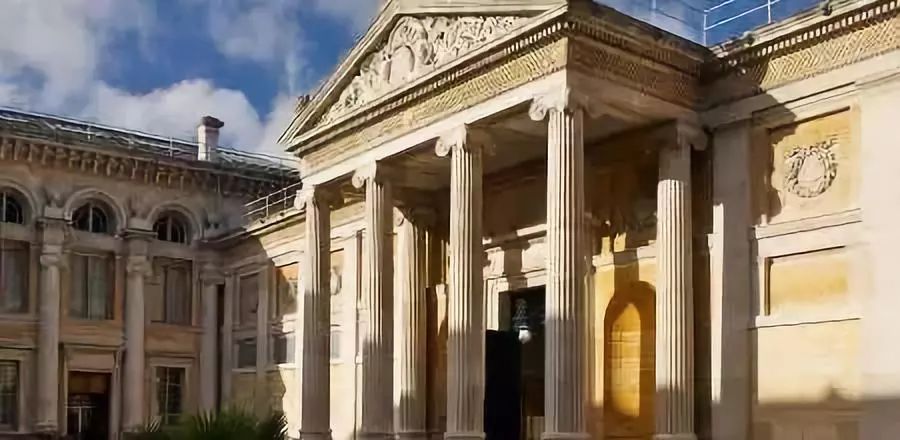
牛津大学阿什莫林博物馆
国际博物馆学委员会委员扬·多拉卡在《国际博物馆协会博物馆定义浅谈》一文中认为“人类一直都在收藏,这种"收藏天性"促使最初博物馆的形成。鉴于人性大同小异,世界各地的博物馆基本方式都极其相似。国际博物馆协会只需要一种博物馆定义,但这并不意味着众多国家的博物馆协会对博物馆都有相同的定义。从严格的科学观来看,并没有公认的、可以被证实或者证伪的博物馆定义,因此博物馆定义需要约定,而博物馆定义不能和博物馆的使命混淆。国际博物馆协会应该确认并通过不是过于狭窄也不是过于宽泛的定义。”
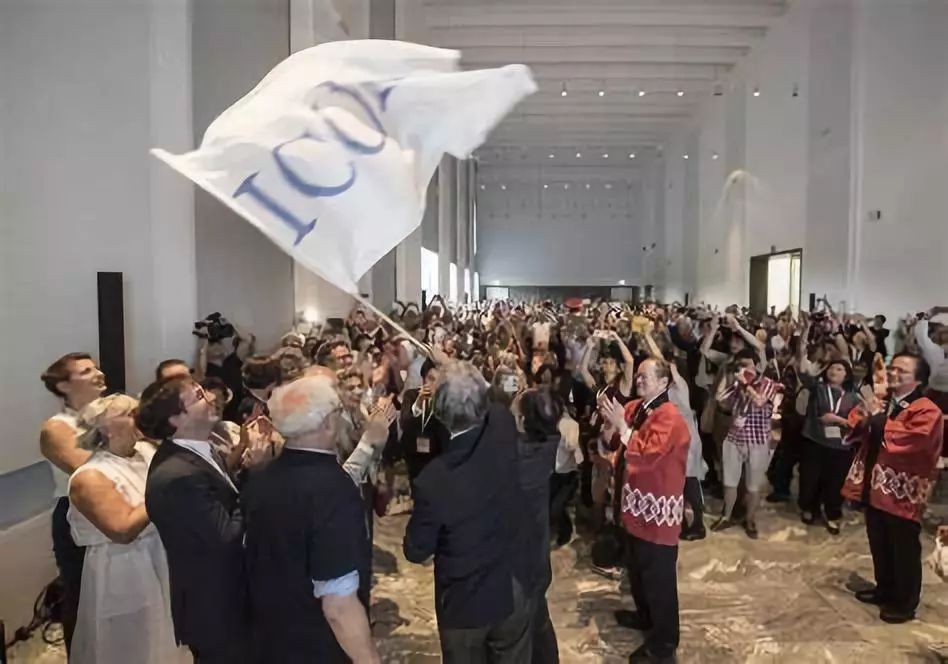
国际博物馆协会会议。
期望最终的投票结果的揭晓,定义不是最终目的,最重要的是博物馆的未来与世界的关系。
注:本期资料综合网络、文献多种资料编辑而成,限于编者水平,难免有误,还请各方指正。
(编辑:李垚辰)
